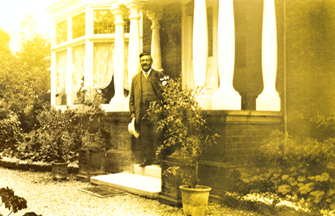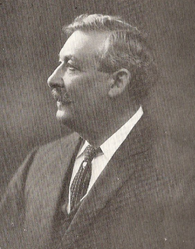The fascinating life of Rodney ‘Gipsy’ Smith, Evangelist and MBE, who lived on Hinton Avenue in Cambridge.
There is a very elegant house down Hinton Avenue, just off Hills Road, by the name of ‘Romany Tan.’ It was the home, for many years, of the celebrated Christian evangelist Gipsy Smith and his family. So long were Gipsy’s travel programmes, one wonders how much time he spent at the house- in contrast to his wife who must have enjoyed the spacious house and garden. His fame spread around the world, and he was the first evangelist to be asked by the BBC to make a radio broadcast, while in London in 1924; he carried on broadcasting for the rest of his life.
Rodney ‘Gipsy’ Smith, son to Cornelius Smith, had been born in a Romani ‘bender’ tent in Epping Forest in 1860; a commemorative stone marks the spot. The six children of Cornelius Smith received no formal education as they followed him around the south-east of England selling baskets, tinware and clothes-pegs. At some point the family were converted to Christianity, probably around 1868; a significant event was the attendance of the family at a service in the Primitive Methodist Chapel in Fitzroy Street, Cambridge.

Gipsy Smith married Annie Penrock, one of his converts, in 1879. Gipsy was already working for the Salvation Army at the invitation of William Booth. For six years he travelled around preaching on street corners and in mission halls; membership grew rapidly and great crowds came to hear him. He received gifts but, this being against the strict Salvation Army code, he was dismissed from their service.
He carried on freelance and such was his popularity that it was no surprise when he was invited to the USA for the first time in 1889. The tradition of revivalism in American churches kept the demand for famous preachers high.
He never forgot his Gypsy roots and would seek out their communities wherever he went and act as an advocate. In 1894 he visited Australia and then travelled across the Pacific to Canada and New York before his return to his wife in England. Following the Boer War, he toured South Africa in 1904. In between travels, while in England, he would attend Hills Road Wesleyan Church. In 1908 and 1909 he travelled to France where again he made a point of visiting Gipsy communities.
During WWI he worked with the YMCA in France. He avoided being sectarian and would usually speak from the heart and lead hymn singing. In recognition of his wartime work he was awarded the MBE by George V. After the war he resumed his visits to the USA (and many other places worldwide) and it was this that lead to his exposure to early broadcasting. He recorded gospel songs onto gramophone records; some of these recordings survive today.
Gipsy’s wife Annie died in 1938; he remarried in California, his secretary, Mary Alice Shaw, who was 50 years his junior. It was about then that he sold ‘Romany Tan.’ He stayed in the USA during the Second World War but returned to London in 1945. He carried on public speaking and the BBC recorded him as well. In 1947 he embarked on the ‘Queen Mary’ for New York but died just as the great ship was entering the Hudson River.
This post was written by Roger Lilley, one of our Trustees at the Museum of Cambridge.
